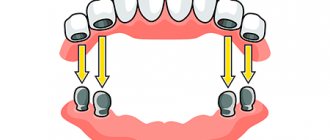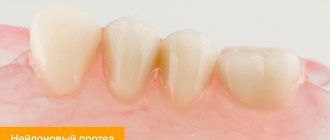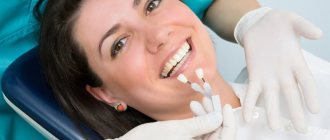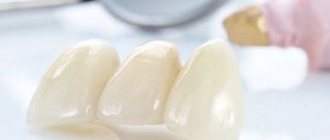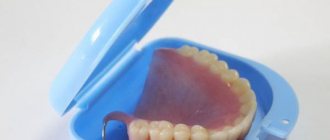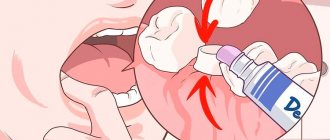The rules for caring for removable dentures are simple and clear - they are very important to follow in order to avoid unpleasant phenomena: shortening the service life of the structure, the appearance of an unpleasant odor, and inflammatory diseases of the oral cavity.
Using a regular toothbrush and toothpaste out of habit can render a denture unusable - this will cause small scratches on the structure and significantly reduce its service life. The result of such improper care is the accumulation of dental plaque and the proliferation of bacteria on the surface due to roughness. That is why it is very important to know several basic rules of care - by following them, you will extend the life of the prosthesis and minimize the risk of complications from wearing it.
Rules of care
Features of hygiene and care of the structure depend on whether you use a cream to fix the prosthesis. Its use allows solving two problems at once: improving the “adhesion” of the structure to tissues, as well as reducing the ingress of food particles under the prosthesis. That is why patients who use such a cream can remove the denture not every time after eating, but once a day.
The general rules for caring for removable dentures are:
- Rinsing the denture after eating - remove the structure and rinse it under running water, removing any remaining food. Be careful - accidentally dropping the prosthesis may cause it to break. It is better to do this over a sink - the likelihood of breakage if dropped is much lower than when washing over a bathtub.
- If your natural teeth are intact, it is important to brush them after eating using a soft toothbrush and toothpaste. Pay attention to your tongue and palate. If your teeth are missing, use a soft gauze swab soaked in mouthwash.
- Caring for removable dentures at home involves cleaning the structure - 2 times a day (morning and evening), thoroughly clean it of dental plaque and the smallest food debris using a soft toothbrush.
It is important to thoroughly clean those parts of the denture that are adjacent to the gums. This is due to their direct contact with soft tissues - careful treatment will avoid inflammatory diseases.
Pay special attention to whether you are bending the metal clasps or the plastic of the prosthesis - you should not do this.
To clean the prosthesis, it is better to choose a low-abrasive paste - a regular one can cause small scratches on the surface of the prosthesis. When buying paste, pay attention to the abrasiveness rating on the package (RDA). Conventional toothpastes have a value of about 60. Children's toothpastes have the lowest abrasiveness. Give preference to products with a value from 0 to 25. In extreme cases, you can use liquid soap, thoroughly rinsing the denture after cleaning.
Choosing the right toothbrush is no less important. Avoid brushes with stiff bristles. It is allowed to use brushes only with soft bristles (marked “soft”).
Stock
-13%
Metal-free dental crown made of zirconium dioxide 40,000 rub.
35,000 rub.
get -13 %
Promotion for installation of veneers!
40000 rub. 35,000 rub.
get -27 %
Teeth in 1 day on Straumann implants using ProArch technology!
300,000 rub. 220,000 rub.
get -15 %
Ceramic braces 100,000 rub.
85,000 rub. get
Disinfection of the prosthesis
From time to time it is important to completely disinfect the prosthesis. This can be done in two ways:
- Caring for removable dentures - their disinfection - is carried out using special means. They are represented by effervescent tablets, for example, Lacalut Dent, Corega, etc. Such tablets contain special substances that dissolve dental deposits - plaque and tartar, and also destroy pathogens. An additional effect of using tablets is to whiten the structure from stains - removing pigments. The tablets are also designed to protect the metal parts of the prosthesis, if any, from corrosion.
- Ultrasonic bath. Caring for removable dentures using such equipment is the best option. The device makes it possible to clean the structure from dental plaque, pigmented plaque, excellently fights unpleasant odors, and destroys 100% of pathogenic bacteria. One of the additional advantages of using an ultrasonic bath is that there is no need to constantly purchase chemicals or brush the denture. The cost of the bath is, of course, higher than a package of tablets, but it is important to remember its functionality - it can also disinfect other objects.
One tablet should be placed in a glass of water at room temperature and the denture should be lowered into it. As a rule, 3 minutes is enough to obtain the desired result - the structure takes on a neat appearance, and pathogenic bacteria are destroyed. If necessary, at the end of the disinfection process you can additionally use a toothbrush previously soaked in the same product. After this, the prosthesis should be rinsed with running water and your hands should be washed thoroughly.
Hygiene and nutrition
When using a removable product, it is important to properly care for your oral cavity. To protect against various pathologies, it is recommended to perform the following actions:
- Use fixing agents that will prevent damage to the mucous membrane.
- Take topical for impaired salivation
- Visit your dentist if you have gum ulcers. Lack of treatment is dangerous due to atrophy of the jaw bone and thinning of the mucous membrane.
- Be sure to clean the device before going to bed, as salivation decreases during this period.
- Do not rinse with running water rich in microorganisms.
In order not to destroy the prosthesis, it is forbidden to eat apples, carrots, nuts, candies, chewing gum, seeds and crackers. Smoking, drinking strong tea, coffee, colored soda or red wine is highly undesirable.
Rules for storing dentures
The care and storage of removable dentures requires compliance with a number of recommendations. The most important of them is the mandatory removal of the structure before going to bed - this helps to avoid premature deformation. The rules for storing removable dentures are as follows.
For the first 10-14 days after manufacture, the dentist may recommend wearing the denture as much as possible, removing it only for a short period, this allows you to quickly adapt to the new design. However, after this time, the tissues of the oral cavity will need rest - it is important to remove the denture for at least 6 hours a day. Caring for nylon removable dentures requires maintaining moisture so that they do not lose their shape - the same is true for plastic structures.
If you are removing dentures for a long time, it is important to place them in a water solution or a special solution for soaking dentures. You can use a glass of water, disinfectant liquid, or a special storage container. The last option can be used for any dentures - you can care for removable dentures made of plastic or nylon, structures containing metal elements. The container looks like a neat box - opaque and hermetically sealed.
Its use helps prevent mechanical damage to the prosthesis and the proliferation of bacteria. Also, if you need to take the prosthesis with you, such a container will be indispensable - it will provide protection against the ingress of microorganisms.
Pay attention to the quality of the water in which you soak the prosthesis if the structure contains metal elements - water with the smell of chlorine can cause the metal to darken.
Do not forget that the main reasons for denture deformation are drying out of the structure, as well as placing it in hot water. If this happens, and the denture after installation causes discomfort, pain while wearing or eating, consult a doctor - most likely, a new denture will be required.
Getting used to the artificial jaw
Before wearing a removable denture becomes comfortable, each patient goes through an adaptation stage.
The orthopedic design is initially perceived as a foreign body, which can affect the patient’s taste and general well-being:
- the perception of temperature and taste characteristics of food changes;
- discomfort, irritation, gag reflex, increased salivation occur;
- the patient may bite his cheeks and tongue;
- there are difficulties in pronunciation and chewing food.
The duration of the adaptation period is individual for each patient. As a rule, after a week the irritation stage passes. Speech with a new prosthesis returns to normal after about 3 weeks, and with constant use, complete adaptation occurs within a month.
How to make it easier to get used to dentures: expert advice
- under the guidance of a dentist, master the skills of independent use of orthodontics (how to put on and take off);
- during the first 2 weeks, try to wear dentures around the clock, removing them only for washing, disinfecting the product and oral hygiene;
- rinse your mouth often with water, drink warm tea;
- use high-quality means for fixing the prosthesis;
- the first few days, give preference to soft foods;
- try to chew slowly, thoroughly, on both sides at once;
- To quickly restore speech, read aloud for 1-2 hours a day, pronounce tongue twisters, talk while holding nuts or candies in your mouth.
Denture care products
There are two categories of care products for removable dentures:
- Fixing. They are used only in conjunction with removable structures and are designed to ensure the strength of their retention in the oral cavity. In addition, reliable fixation helps restore diction, protect soft tissues from injury under constant mechanical influence of the artificial structure, and improve chewing function. There are several types of fixing agents:
- powder - it is sprayed in a thin layer onto the surface of the prosthesis, after which the structure is put on and pressed to the gums for a certain time. As a rule, such a remedy is widely used for low salivation; it allows you to securely fasten the prosthesis;
- cream - it is applied in a thin layer to the edge of the prosthesis - dotted or in strips. It is worth noting that a large volume of applied product will lead to its removal to the outside - it is important to observe the measure. This cream is designed not only to fix the prosthesis in the oral cavity, but also to create a shock-absorbing pad to protect the gum tissue from mechanical stress.
- strips are special products that are used when the patient cannot get used to the presence of a foreign body in the oral cavity. The strips are placed under the prosthesis, which allows you to soften the pressure and fix the structure.
- Cleansing. Cleaning products for the care of removable dentures are presented as follows:
- a brush with soft bristles - it is important to change it monthly, and if inflammatory diseases of the oral cavity occur, the replacement is made prematurely;
- brush - allows you to clean the spaces between teeth;
- paste - with low abrasiveness or without abrasive particles at all;
- rinse aid - a liquid with a disinfectant effect: tablets that dissolve in water or pharmaceutical products with an antibacterial effect;
- an irrigator is a device that allows you to wash out food particles and dental plaque even from hard-to-reach places; you can choose a compact irrigator for home use;
- floss - dental floss for cleaning interdental spaces and the peri-gingival area.
As a rule, the cream lasts for at least 12-24 hours, after which the product is dissolved by saliva. This requires rinsing the prosthesis and removing any residue.
Following recommendations for the care of removable dentures will ensure wearing comfort, prevent possible complications and extend the life of the structure. The installation of a prosthesis by an orthopedic dentist is necessarily accompanied by an explanation of the rules for caring for the structure and, if necessary, prescribing the products that will be required for care.
Basic Rules
The dental technician’s office must be equipped with all the necessary dental equipment , tools and materials for high-quality processing of the prosthesis.
Every qualified dental technician must know the following rules:
- basics of technical use of the equipment on which it works;
- sequence of work performed;
- features of marking and the main properties of the materials used in the work;
- hygienic and aesthetic requirements for prosthetic structures of various types;
- basic technical requirements that apply to the quality of processed dentures and structural elements;
- reasons why a product may be unsuitable, methods for identifying, correcting and preventing them;
- general safety rules.
In addition, the specialist must know the composition of polishing mixtures, be able to prepare them, and also use them correctly.
He needs to correctly select the polishing and grinding mode, depending on the material from which the prosthesis is made. It is best to use modern specialized equipment, high-quality tools and materials in your work.
However, the key to a safe and successful procedure is an experienced, qualified specialist who will process the prosthesis in accordance with all established rules.

